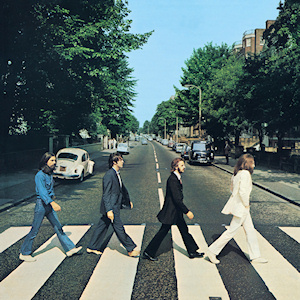Reflecting on The Beatles’ discography
Simplicities and intricacies of Beatles songwriting lead to mixed reactions

One of the most recognized and interpolated musical photographs is the cover of the band’s 11th album , “Abbey Road”.
April 8, 2021
The Beatles are a group whose fame makes them difficult to write about. They are a behemoth of musical genius, and their songs have become so ubiquitous I am not sure I feel qualified to have a conversation with their works. I have never once thought myself capable of concocting a profound opinion of the group. Of course, I have my answer ready when asked which one is my favorite, and I participate in the general agreement that “Sgt. Pepper’s Lonely Hearts Club Band” is one of the greatest records ever made. My first album bought on vinyl was “The White Album” and I laid on the floor of my bedroom listening to it from start to finish over and over again. But, I’ve never allowed myself to think of them deeply, to form my own opinion about what their music means and how it’s impacted me personally. When I hear their music my initial response is always to think back to their hold upon my childhood memories —when their silly songs like “Yellow Submarine” and “Ob-La-Di, Ob-La-Da” spun around my brain and puzzled me exceedingly, or when I first heard “Eleanor Rigby” and “Blackbird” and I felt a deep sense of empathy before I knew what the word even meant. I’ve never thought to analyze how or why these songs elicited such strong connections from me and still do to this day. How is it that The Beatles have become so intertwined in our public discourse that we can have opinions of them before we even realize how we acquired them?
This seems indicative of their ability to resonate within the soul– to make music that speaks for itself. There is no need to defend yourself when you claim love for them, I don’t believe they will or should ever become “overrated.” Such overwhelming appreciation for their music stems from the simplicity of their songs. It is difficult to make a complex song, and even harder to make a simple one and with the sheer amount of minimalist greatness The Beatles put out one receives a soundtrack for eternity. There is a timelessness, a closeness with something primal. It is like a Dickinson poem, one that displays a rightness of order that electrifies the mind. It’s as if their music precedes time, marching alongside the constant and unmovable struggles of human existence capturing its qualities with a true likeness.
I believe these feelings have held me back from analyzing their music through my own lens, but I do hope to try. I choose “Here Comes the Sun”, perhaps their simplest and most popular song, to reflect upon. It feels right to choose a song about renewal and the passing of a dark time. It is the last song written by George Harrison for The Beatles and is a ray of eternal sunshine on the “Abbey Road” album. It illustrated a personal burgeoning of Harrison’s songwriting capabilities that spread to one of my favorite albums: “All Things Must Pass”.
But beyond this personal musical triumph for Harrison, the song contains rich sonic and lyrical implications. The initial light pluckings come as softly as spring, like the pushing up of new blossoms through the snow. It feels like light coming slanted through the blinds, and the opening of the front door by someone you’ve missed. The guitar glimmers like concentric circles on a pond extending a motif throughout the song that uplifts with each moment. The Moog synthesizer shortly joins the guitar, filling in the gaps like a friend calling out your name and joining you on your walk.
“Here Comes the Sun”, Harrison expresses like he’s seen your secret sadness all this time. “And I say, it’s all right.” It is the most uncomplicated phrase in the world– as steadfast as the sunrise, as unobtrusive as a warm breeze. Light has pierced the darkness. He remarks on a “long cold lonely winter” expressing a profound depth of pain in four short words. Again I must remark on his simplifying of intense human feeling — of minimizing strife by compacting it into singular images and a season now gone.
The crux of this song is placed on one tiny word, “it.” The ‘it’ in “it feels like years since it’s been here” Literally speaking it is the sun, but put this way, it becomes universal. It is any happy notion your mind can muster, it all fits inside something you wouldn’t expect, something so small that removing any part from its whole would cause its disappearance. It is the strongest, hardest and most unchanging word in the whole song, like a little diamond compressed so profoundly it contains all within it unchangeably.
The song fades away, “Sun, sun, sun, here it comes,” and the duality of “it” presents itself once more. “It” could be expressing the sun’s arrival, but I choose to believe the narrator of the song is talking to the sun, like a friend. They are both anticipating “it” coming. The arrival of something beyond earthly ills and painful winters. A transcendence unimaginable.













